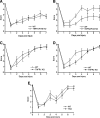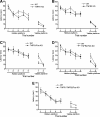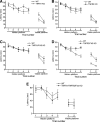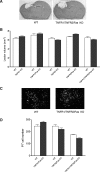Genetic analysis of the role of tumor necrosis factor receptors in functional outcome after traumatic brain injury in mice
- PMID: 20205514
- PMCID: PMC2943499
- DOI: 10.1089/neu.2009.1229
Genetic analysis of the role of tumor necrosis factor receptors in functional outcome after traumatic brain injury in mice
Abstract
We previously reported that tumor necrosis factor-alpha (TNF-alpha) and Fas receptor induce acute cellular injury, tissue damage, and motor and cognitive deficits after controlled cortical impact (CCI) in mice (Bermpohl et al. 2007 ); however, the TNF receptors (TNFR) involved are unknown. Using a CCI model and novel mutant mice deficient in TNFR1/Fas, TNFR2/Fas, or TNFR1/TNFR2/Fas, we tested the hypothesis that the combination of TNFR2/Fas is protective, whereas TNFR1/Fas is detrimental after CCI. Uninjured knockout (KO) mice showed no differences in baseline physiological variables or motor or cognitive function. Following CCI, mice deficient in TNFR2/Fas had worse post-injury motor and Morris water maze (MWM) performance than wild-type (WT) mice (p < 0.05 group effect for wire grip score and MWM performance by repeated measures ANOVA). No differences in motor or cognitive outcome were observed in TNFR1/Fas KO, or in TNFR2 or TNFR1 single KO mice, versus WT mice. Additionally, no differences in propidium iodide (PI)-positive cells (at 6 h) or lesion size (at 14 days) were observed between WT and TNFR1/Fas or TNFR2/Fas KO mice. Somewhat surprisingly, mice deficient in TNFR1/TNFR2/Fas also had PI-positive cells, lesion size, and motor and MWM deficits similar to those of WT mice. These data suggest a protective role for TNFR2/Fas in the pathogenesis of TBI. Further studies are needed to determine whether direct or indirect effects of TNFR1 deletion in TNFR2/Fas KO mice mediate improved functional outcome in TNFR1/TNFR2/Fas KO mice after CCI.
Figures





References
-
- Beg A.A. Baltimore D. An essential role for NF-kappaB in preventing TNF-alpha-induced cell death. Science. 1996;274:782–784. - PubMed
-
- Bermpohl D. You Z. Korsmeyer S.J. Moskowitz M.A. Whalen M.J. Traumatic brain injury in mice deficient in Bid: effects on histopathology and functional outcome. J. Cereb. Blood Flow Metab. 2006;26:625–633. - PubMed
-
- Bermpohl D. You Z. Lo E.H. Kim H.H. abd Whalen M.J. TNF alpha and Fas mediate tissue damage and functional outcome after traumatic brain injury in mice. J. Cereb. Blood Flow Metab. 2007;27:1806–1818. - PubMed
-
- Bruce A.J. Boling W. Kindy M.S. Peschon J. Kraemer P.J. Carpenter M.K. Holtsberg F.W. Mattson M.P. Altered neuronal and microglial responses to excitotoxic and ischemic brain injury in mice lacking TNF receptors. Nat. Med. 1996;2:788–794. - PubMed
-
- Bruce-Keller A.J. Geddes J.W. Knapp P.E. McFall R.W. Keller J.N. Holtsberg F.W. Parthasarathy S. Steiner S.M. Mattson M.P. Anti-death properties of TNF against metabolic poisoning: mitochondrial stabilization by MnSOD. J. Neuroimmunol. 1999;93:53–71. - PubMed
Publication types
MeSH terms
Substances
Grants and funding
LinkOut - more resources
Full Text Sources
Research Materials
Miscellaneous

